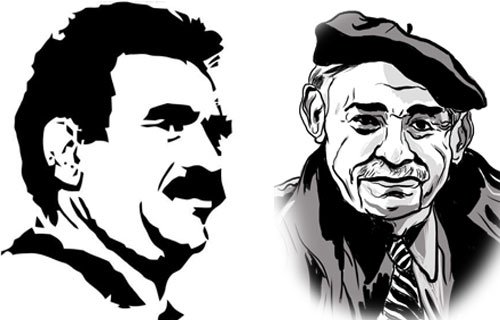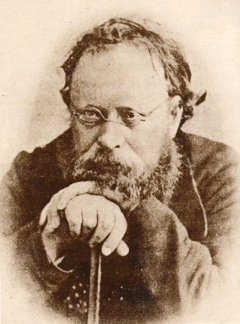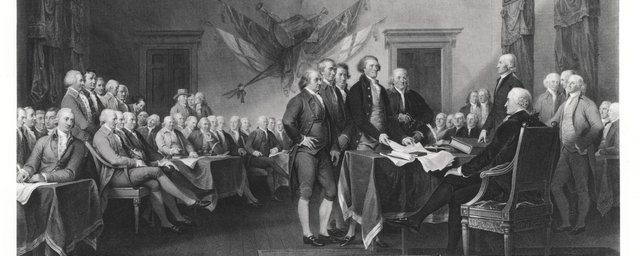“The Republic is the organization through which all opinions and activities remain free, the People, through the very divergence of opinions and wills, thinking and acting as a single man. In the Republic, all citizens, by doing what they want and nothing more, directly participate in the legislation and the government as they participate in the production and circulation of wealth. Therefore, all citizens are kings because they all have complete power; they reign and govern. The Republic is a positive anarchy. It is neither liberty subject to order, as in the constitutional monarchy, nor liberty imprisoned in order, as the provisional government understands it, but liberty delivered from all its obstacles, superstition, prejudice, sophistry, speculation and authority; it is a reciprocal, not limited, liberty; it is the liberty that is the MOTHER, not the daughter, of order.”—Pierre-Joseph Proudhon (The Solution of the Social Problem)

The democratic confederalism of Murray Bookchin and Abdullah Öcalan seems to me to be essentially a development upon Montesquieu’s idea of the confederate republic. It is basically aligned with the ideas of the American Founding Fathers as expressed in The Federalist Papers. (Cf. Federalist No. 9) It holds that people ought to democratically elect representatives or delegates to represent them in deliberative assemblies or councils for democratic decision-making. And these views align with those expressed by Pierre-Joseph Proudhon in The Principle of Federation and partially align with Proudhon’s General Idea of the Revolution in the 19th Century. Anarchism and democratic confederalism are the left-libertarian branch of the republican and federalist movement. The libertarian left simply carried the principles and ideas of republicanism and federalism to their logical conclusion.
The terms “federal” and “confederal” derive from the Latin foedus, which means contract. A genuine federation or confederation is a voluntary union based on contractual agreement. If people govern locally through democratic assemblies and elect delegates to represent them in councils in which multiple localities are represented, and these local groups freely agree to mutually assist one another with matters such as welfare and national defense, then you have a form of confederation. Proudhon thought that it was possible to have a system based upon such free contract and federation, and he called this system anarchy. Insofar as the system of democracy and federation are perfected, government above (and apart from) the people ceases to exist. Pure democracy is anarchy. Proudhon would have supported a more loose “free association” model over the formal delegative direct democracy of Bookchin, but his vision was definitely federalist. Anarchism is a form of federalism and republicanism but it differs from other forms of federalism and delegative democracy insofar as it emphasizes the desire to do away with all rulers and rest power in the hands of the people themselves—the people are not to elect rulers!—and it constantly critiques and challenges all authority and hierarchy and demands that any authority that cannot be justified ought to be abolished. Thus, anarchism has a strong libertarian spirit that informs its democratic confederalism.
Insofar as the anarchist tradition is basically republican, notwithstanding the anarchist critique of republican systems, it becomes apparent that one does not have to choose between anarchism and social democracy. The two perspectives are not mutually exclusive. This is why I call myself an anarchist social democrat. I am heavily influenced by Bookchin and Proudhon, but also by Bernstein and the Fabians.
“I don’t see how any complex system can avoid some sort of representative democracy…. Representatives should be accountable, recallable, subject to constant surveillance and control, and interchangeable.”—Noam Chomsky
Anarchist purists would say that this sort of anarchism isn't really “anarchist,” but even Chomsky admits that some sort of representative or delegative democracy is necessary. Generally, the terms “representative” and “delegate” are interchangeable. However, Pierre-Joseph Proudhon, Peter Kropotkin, and Murray Bookchin, although technically advocating a variety of representative democracy, chose to draw a distinction between representatives, or elected politicians, and delegates, who are recallable and duty bound to vote as their constituents would have them vote. The delegates within an anarchistic republican system would not be allowed to vote or act of their own will. They would be required to do what their constituents direct them to do—the delegate would be bound by the constituents’ decision, not the constituents by the delegates’ decision—, and the constituents would be able to easily recall and replace their delegate at any time.

“In the end, we are all electors; we can choose the most worthy.
“We can do more; we can follow them step by step in their legislative acts and their votes; we shall make them transmit our arguments and our documents; we shall indicate our will to them, and when we are discontented, we shall recall and dismiss them.
“The choice of abilities, imperative mandate, permanent revocability—these are the most immediate and incontestable consequences of the electoral principle. It is the inevitable program of all democracy.”—Pierre-Joseph Proudhon (The Solution of the Social Problem)
Anarchism simply carried republicanism/federalism to its logical conclusion. If the people are to govern, then their representatives ought to be bound to serve the interests of the people rather than their own self-interest. The American system gave us a form of republicanism and federalism that allowed the representatives to do as they please. Ultimately, the system ended up being far less democratic than one might have hoped. At no point in American history has America been “great.” America was born as a white supremacist patriarchal State. The system of government instituted by the Founders would not allow racial minorities and women to have any representation, and representatives were not bound to be faithful to their constituents. A politician can lie to get into office and there is nothing to stop a lying politician from taking office by publicly promoting a popular platform and then going against that same platform with every vote he casts in office.
The system of governance given to us by the Founding Fathers has failed to guarantee us the rights to life, liberty, and possessions. We find the “Federal Government” to be nothing more than a despotic regime. There is very little semblance of democracy left in the system. A tyrant who is hated by the majority has become a de facto dictator. And the current regime seems hell-bent on destroying public education, banning science, ruining healthcare, and violating the unalienable rights of immigrants, minorities, and queers. It seems like time for a new American revolution, a new constitution, and a new confederation based on new principles of democracy that are better constructed in order to safeguard against the tyrannies that have plagued us thus far. The American system was a bold stand, but also an utter failure. It failed to guarantee life, liberty, and possessions to the majority of its populace. There was slavery, segregation, and Jim Crow; women were oppressed; now LGBTQ people, Native Americans, and immigrants are being oppressed and murdered by the tyrannical State. The State has engaged in wars that the majority of its citizens opposed! Presidents who are disliked by the majority of the populace are allowed to rule over us. It is blatantly obvious that America is not great and is moving away from greatness. Norway, Denmark, Sweden, Finland, Iceland, Switzerland, Estonia, New Zealand, the Netherlands, Australia, Canada, and the United Kingdom are all objectively better than America both economically and politically. If free immigration were a thing, I would quickly leave the U.S. and go to one of those places, but the American government charges one to expatriate and the foreign governments have restrictions on immigration, so that one must have many thousands of dollars saved up in order to “leave it.” As long as I am stuck here, I will demand a reformation. I demand a reformation of governance until it conforms to the fullest development of democratic organization theory as directed by rational ethical principles and scientific thinking.

The American Founding Fathers relied too much on the ideas of Montesquieu when they created our system of government. They rightly recognized that a republican system of government would need separation of powers and a system of checks and balances in order to protect the people from tyrannical encroachments of government. Under the statist republican model, one of the checks is the power of the President. The President has the power to veto laws passed by Congress. This quasi-monarch can also legislate through executive orders, but be checked by the Judicial Branch. Unfortunately, the Judicial Branch is limited in its ability to check the President, and the President also appoints people to the Supreme Court, which creates a conflict of interest on the part of any Justice he appoints. The power of the Presidency is far too strong. And the President has the ability to quickly become a totalitarian dictator if he so chooses. There are three branches of government—Legislative, Executive, and Judicial—but the Legislative Branch is the only one that is even remotely democratic. The people can elect their representatives and the representatives have to maintain some level of popular approval among their constituents in order to keep getting re-elected. The President really doesn’t have to worry about maintaining popular approval, especially after his second term. The people do not have any direct say in appointing Supreme Court Justices. This means that the Legislative Branch is the most democratic part of government, but the monarchical element in the Executive can veto Congress’ decisions in order to subvert the democratic process. This system of checks and balances does not work and it has left us in our current predicament, with a de facto dictator who is hated by the vast majority of Americans. (Cf. my remarks on abolishing the Presidency in Beyond Utopianism: A Practical Agenda for Libertarian Social Democrats)
I propose that we scrap this model of checks and balances in favor of comprehensive counterbalanced democracy. My idea of comprehensive counterbalanced democracy is simply the notion that our system of democracy ought to be comprehensive, incorporating the best elements of various forms of democracy, and that the system of checks and balances ought to be democratic themselves. There are various forms of democracy. There is direct democracy, representative democracy, consensus democracy, etc. Each type of democracy limits the application of other forms of democracy. Thus, it is possible for us to create a system in which the checks and balances are democratic. Developing a form of comprehensive counterbalanced democracy that is able to overcome the shortcomings of certain types of democratic processes by using other democratic processes in order to check them would give us the best of all possible worlds.
First, I think that we ought to hark back to the roots of democracy in Athens and the practice of choosing councilmen by sortition. We ought to eliminate politicians from the system altogether. Candidates ought to be chosen through sortition or lottery. (Sortitionism) Members of the local community ought to be selected at random to be potential delegates. If the member selected does not want to be a delegate, then another member is to be selected at random in their place. Four people from the local community ought to be selected as candidates and the people should choose from those randomly selected candidates in order to elect their delegate. The candidates would give speeches and explain their views and what they think their duties as a delegate will be. The people shall choose whichever random candidate happens to seem most trustworthy and reliable. The delegates would be subject to an imperative mandate and would be recallable and replaceable. These delegates would serve for a term of two years. (Delegative Democracy) It might be desirable to have online elections wherein members of the local community choose their preferred candidate. However, instead of closing the polls after the election, the polls should be left open so that the people can change their vote at any time. Thus, if a representative falls into disfavor among their constituents, this would be reflected in the online polls and the office of delegate would pass to the new most preferred candidate. This would mean continuous elections and automatic replacement of delegates with high disapproval ratings. (Digital Democracy) At the most local level, assembly democracy ought to be used in order to make basic decisions. The principle of ho boulomenos (“whosoever wishes”) should be upheld so that anyone who wishes to speak at the general assembly may voice their opinion and be part of the deliberative process. (Assembly Democracy) Delegates from the local neighborhood assemblies would sit upon district councils where council members would deliberate and discuss matters that concerned multiple neighborhoods in the same area. The district councils would deliberate and appoint delegates to serve on municipal councils, and municipal councils would send delegates to regional councils, and so on to provincial and even national or international levels. The members of these councils would be part of a deliberative assembly that makes decisions based upon rational discussion and debate. (Deliberative Democracy) The councils should be required to reach a general consensus in order to pass a rule or adopt a policy. Instead of a simple majority, they should have to have a general consensus. Unanimity may be impossible to reach, but a general consensus is obtainable. Delegates should be required to use a consensus model of decision-making within the councils on which they serve. Delegates should be able to raise objections, discuss concerns, propose modifications to proposals, accept a proposal, accept with reservation, stand-aside, or block a proposal. To stand aside indicates that the delegate does not think the proposal really affects his constituents. A blocking motion would indicate that the delegate suspects the proposal to be absolutely unacceptable to his constituents. (Consensus Democracy) Finally, after a law or policy is finalized and adopted by the council, the text of the proposal or law, along with recordings and transcripts of relevant discussions could be posted online with a poll. The people would have the ability to directly review and accept or veto the proposal or law. If the majority are in favor of blocking the proposal, they can veto the decision of the council through a simple directly democratic process. (Digital Direct Democracy & Majoritarian Democracy) Furthermore, the justice system within this democratic confederation would require trial by jury. Jurors would be chosen by lot or sortition. If a person is unwilling to serve on the jury, another person is chosen by lot as a replacement. The jury would pass its judgement based on unanimous consensus. The jury would have the right to judge the evidence, interpret the law, and judge the justice of the law itself. If a person is being put on trial for some crime, and the jurors feel that the person is guilty but that the law is unfair (or that strict application of the law would be unfair due to extenuating circumstances), then the jury would be allowed to refuse to convict on those grounds. Jury nullification would serve as a democratic check on the power of legislation. (Jury Nullification) Within this system of governance, preference should usually be given to consensus-oriented processes. Whenever consensus is not possible, a system of "ranked-choice voting" or "instant run-off voting" should be used. Each democratic institution and practice would serve to create checks and balances on other democratic institutions and practices. This would give us a more comprehensive form of democracy while counterbalancing the negative effects of certain forms of democracy, giving us a comprehensive counterbalanced democracy that is an improvement over the alternatives.
You had me at "voluntary" and "contractual". :)
Why not take these ideas even further? Why have one representative for all policy issues? Why not pick from multiple delegated within various categories. I might want one person to represent my views on the environment becuase that's their speciality, another on defense, yet another on domestic economic issues, etc. Why not make it automated so we could configure proxy voters for specific issue categories who may not even be elected themselves, but our vote will go as theirs does? I feel like technology today allows us to think so much bigger than what was even conceivable in the past.
Downvoting a post can decrease pending rewards and make it less visible. Common reasons:
Submit